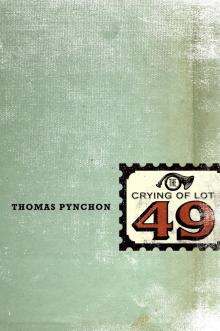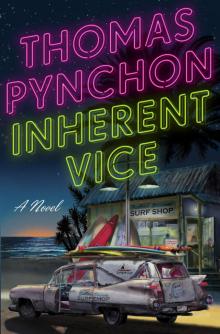- Home
- Thomas Pynchon
Uncollected Works Page 8
Uncollected Works Read online
Page 8
Perhaps the future of Sloth will lie in sinning against what now seems increasingly to define us—technology. Persisting in Luddite sorrow, despite technology’s good intentions, there we’ll sit with our heads in virtual reality, glumly refusing to be absorbed in its idle, disposable fantasies, even those about superheroes of Sloth back in Sloth’s good old days, full of leisurely but lethal misadventures with the ruthless villains of the Acedia Squad.
Book Reviews
The Gift
Tombstone, Arizona, during the 1880’s is, in ways, our national Camelot: a never-never land where American virtues are embodied in the Earps, and the opposite evils in the Clanton gang; where the confrontation at the OK corral takes on some of the dry purity of the Arthurian joust. Oakley Hall, in his very fine novel Warlock (Viking) has restored to the myth of Tombstone its full, mortal, blooded humanity. Wyatt Earp is transmogrified into a gunfighter named Blaisdell who, partly because of his blown-up image in the Wild West magazines of the day, believes he is a hero. He is summoned to the embattled town of Warlock by a committee of nervous citizens expressly to be a hero, but finds that he cannot, at last, live up to his image; that there is a flaw not only in him, but also, we feel, in the entire set of assumptions that have allowed the image to exist. It is Blaisdell’s private abyss, and not too different from the town’s public one. Before the agonized epic of Warlock is over with—the rebellion of the proto-Wobblies working in the mines, the struggling for political control of the area, the gunfighting, mob violence, the personal crises of those in power—the collective awareness that is Warlock must face its own inescapable Horror: that what is called society, with its law and order, is as frail, as precarious, as flesh and can be snuffed out and assimilated back into the desert as easily as a corpse can. It is the deep sensitivity to abysses that makes Warlock one of our best American novels. For we are a nation that can, many of us, toss with all aplomb our candy wrapper into the Grand Canyon itself, snap a color shot and drive away; and we need voices like Oakley Hall’s to remind us how far that piece of paper, still fluttering brightly behind us, has to fall.
Holiday vol. 38, #6
December 1965, pp. 164-5
The Heart’s Eternal Vow
By Thomas Pynchon
April 10, 1988
LOVE IN THE TIME OF CHOLERA By Gabriel Garcia Marquez. Translated by Edith Grossman. 348 pp. New York: Alfred A. Knopf. $18.95.
LOVE, as Mickey and Sylvia, in their 1956 hit single, remind us, love is strange. As we grow older it gets stranger, until at some point mortality has come well within the frame of our attention, and there we are, suddenly caught between terminal dates while still talking a game of eternity. It’s about then that we may begin to regard love songs, romance novels, soap operas and any live teen-age pronouncements at all on the subject of love with an increasingly impatient, not to mention intolerant, ear.
At the same time, where would any of us be without all that romantic infrastructure, without, in fact, just that degree of adolescent, premortal hope? Pretty far out on life’s limb, at least. Suppose, then, it were possible, not only to swear love “forever,” but actually to follow through on it - to live a long, full and authentic life based on such a vow, to put one’s alloted stake of precious time where one’s heart is? This is the extraordinary premise of Gabriel Garcia Marquez’s new novel “Love in the Time of Cholera,” one on which he delivers, and triumphantly.
In the postromantic ebb of the 70’s and 80’s, with everybody now so wised up and even growing paranoid about love, once the magical buzzword of a generation, it is a daring step for any writer to decide to work in love’s vernacular, to take it, with all its folly, imprecision and lapses in taste, at all seriously -that is, as well worth those higher forms of play that we value in fiction. For Garcia Marquez the step may also be revolutionary. “I think that a novel about love is as valid as any other,” he once remarked in a conversation with his friend, the journalist Plinio Apuleyo Mendoza (published as “El Olor de la Guayaba,” 1982). “In reality the duty of a writer - the revolutionary duty, if you like - is that of writing well.”
And - oh boy - does he write well. He writes with impassioned control, out of a maniacal serenity: the Garcimarquesian voice we have come to recognize from the other fiction has matured, found and developed new resources, been brought to a level where it can at once be classical and familiar, opalescent and pure, able to praise and curse, laugh and cry, fabulate and sing and when called upon, take off and soar, as in this description of a turn-of-the-century balloon trip:
“From the sky they could see, just as God saw them, the ruins of the very old and heroic city of Cartagena de Indias, the most beautiful in the world, abandoned by its inhabitants because of the sieges of the English and the atrocities of the buccaneers. They saw the walls, still intact, the brambles in the streets, the fortifications devoured by heartsease, the marble palaces and the golden altars and the viceroys rotting with plague inside their armor.
“They flew over the lake dwellings of the Trojas in Cataca, painted in lunatic colors, with pens holding iguanas raised for food and balsam apples and crepe myrtle hanging in the lacustrian gardens. Excited by everyone’s shouting, hundreds of naked children plunged into the water, jumping out of windows, jumping from the roofs of the houses and from the canoes that they handled with astonishing skill, and diving like shad to recover the bundles of clothing, the bottles of cough syrup, the beneficent food that the beautiful lady with the feathered hat threw to them from the basket of the balloon.”
This novel is also revolutionary in daring to suggest that vows of love made under a presumption of immortality - youthful idiocy, to some -may yet be honored, much later in life when we ought to know better, in the face of the undeniable. This is, effectively, to assert the resurrection of the body, today as throughout history an unavoidably revolutionary idea. Through the ever-subversive medium of fiction, Garcia Marquez shows us how it could all plausibly come about, even - wild hope -for somebody out here, outside a book, even as inevitably beaten at, bought and resold as we all must have become if only through years of simple residence in the injuring and corruptive world.
HERE’S what happens. The story takes place between about 1880 and 1930, in a Caribbean seaport city, unnamed but said to be a composite of Cartagena and Barranquilla - as well, perhaps, as cities of the spirit less officially mapped. Three major characters form a triangle whose hypotenuse is Florentino Ariza, a poet dedicated to love both carnal and transcendent, though his secular fate is with the River Company of the Caribbean and its small fleet of paddle-wheel steamboats. As a young apprentice telegrapher he meets and falls forever in love with Fermina Daza, a “beautiful adolescent with … almond-shaped eyes,” who walks with a “natural haughtiness … her doe’s gait making her seem immune to gravity.” Though they exchange hardly a hundred words face to face, they carry on a passionate and secret affair entirely by way of letters and telegrams, even after the girl’s father has found out and taken her away on an extended “journey of forgetting.” But when she returns, Fermina rejects the lovesick young man after all, and eventually meets and marries instead Dr. Juvenal Urbino who, like the hero of a 19th-century novel, is well born, a sharp dresser, somewhat stuck on himself but a terrific catch nonetheless.
For Florentino, love’s creature, this is an agonizing setback, though nothing fatal. Having sworn to love Fermina Daza forever, he settles in to wait for as long as he has to until she’s free again. This turns out to be 51 years, 9 months and 4 days later, when suddenly, absurdly, on a Pentecost Sunday around 1930, Dr. Juvenal Urbino dies, chasing a parrot up a mango tree. After the funeral, when everyone else has left, Florentino steps forward with his hat over his heart. “Fermina,” he declares, “I have waited for this opportunity for more than half a century, to repeat to you once again my vow of eternal fidelity and everlasting love.” Shocked and furious, Fermina orders him out of the house. “And don’t show your face again for the years of l
ife that are left to you… . I hope there are very few of them.”
The heart’s eternal vow has run up against the world’s finite terms. The confrontation occurs near the end of the first chapter, which recounts Dr. Urbino’s last day on earth and Fermina’s first night as a widow. We then flash back 50 years, into the time of cholera. The middle chapters follow the lives of the three characters through the years of the Urbinos’ marriage and Florentino Ariza’s rise at the River Company, as one century ticks over into the next. The last chapter takes up again where the first left off, with Florentino, now, in the face of what many men would consider major rejection, resolutely setting about courting Fermina Daza all over again, doing what he must to win her love.
IN their city, throughout a turbulent half-century, death has proliferated everywhere, both as el colera, the fatal disease that sweeps through in terrible intermittent epidemics, and as la colera, defined as choler or anger, which taken to its extreme becomes warfare. Victims of one, in this book, are more than once mistaken for victims of the other. War, “always the same war,” is presented here not as the continuation by other means of any politics that can possibly matter, but as a negative force, a plague, whose only meaning is death on a massive scale. Against this dark ground, lives, so precarious, are often more and less conscious projects of resistance, even of sworn opposition, to death. Dr. Urbino, like his father before him, becomes a leader in the battle against the cholera, promoting public health measures obsessively, heroically. Fermina, more conventionally but with as much courage, soldiers on in her chosen role of wife, mother and household manager, maintaining a safe perimeter for her family. Florentino embraces Eros, death’s well-known long-time enemy, setting off on a career of seductions that eventually add up to 622 “long-term liaisons, apart from … countless fleeting adventures,” while maintaining, impervious to time, his deeper fidelity, his unquenchable hope for a life with Fermina. At the end he can tell her truthfully - though she doesn’t believe it for a minute - that he has remained a virgin for her.
So far as this is Florentino’s story, in a way his Bildungsroman, we find ourselves, as he earns the suspension of our disbelief, cheering him on, wishing for the success of this stubborn warrior against age and death, and in the name of love. But like the best fictional characters, he insists on his autonomy, refusing to be anything less ambiguous than human. We must take him as he is, pursuing his tomcat destiny out among the streets and lovers’ refuges of this city with which he lives on terms of such easy intimacy, carrying with him a potential for disasters from which he remains safe, immunized by a comical but dangerous indifference to consequences that often borders on criminal neglect. The widow Nazaret, one of many widows he is fated to make happy, seduces him during a night-long bombardment from the cannons of an attacking army outside the city. Ausencia Santander’s exquisitely furnished home is burgled of every movable item while she and Florentino are frolicking in bed. A girl he picks up at Carnival time turns out to be a homicidal machete-wielding escapee from the local asylum. Olimpia Zuleta’s husband murders her when he sees a vulgar endearment Florentino has been thoughtless enough to write on her body in red paint. His lover’s amorality causes not only individual misfortune but ecological destruction as well: as he learns by the end of the book, his River Company’s insatiable appetite for firewood to fuel its steamers has wiped out the great forests that once bordered the Magdalena river system, leaving a wasteland where nothing can live. “With his mind clouded by his passion for Fermina Daza he never took the trouble to think about it, and by the time he realized the truth, there was nothing anyone could do except bring in a new river.”
IN fact, dumb luck has as much to do with getting Florentino through as the intensity or purity of his dream. The author’s great affection for this character does not entirely overcome a sly concurrent subversion of the ethic of machismo, of which Garcia Marquez is not especially fond, having described it elsewhere simply as usurpation of the rights of others. Indeed, as we’ve come to expect from his fiction, it’s the women in this story who are stronger, more attuned to reality. When Florentino goes crazy with live, developing symptoms like those of cholera, it is his mother, Transito Ariza, who pulls him out of it. His innumerable lecheries are rewarded not so much for any traditional masculine selling points as for his obvious and aching need to be loved. Women go for it. “He is ugly and sad,” Fermina Daza’s cousin Hildebranda tells her, “but he is all love.”
And Garcia Marquez, straight-faced teller of tall tales, is his biographer. At the age of 19, as he has reported, the young writer underwent a literary epiphany on reading the famous opening lines of Kafka’s “Metamorphosis,” in which a man wakes to find himself transformed into a giant insect. “Gosh,” exclaimed Garcia Marquez, using in Spanish a word we in English may not, “that’s just the way my grandmother used to talk!” And that, he adds, is when novels began to interest him. Much of what come in his work to be called “magic realism” was, as he tells it, simply the presence of that grandmotherly voice.
Nevertheless, in this novel we have come a meaningful distance from Macondo, the magical village in “One Hundred Years of Solitude” where folks routinely sail through the air and the dead remain in everyday conversation with the living: we have descended, perhaps in some way down the same river, all the way downstream, into war and pestilence and urban confusions to the edge of a Caribbean haunted less by individual dead than by a history which has brought so appallingly many down, without ever having spoken, or having spoken gone unheard, or having been heard, left unrecorded. As revolutionary as writing well is the duty to redeem these silences, a duty Garcia Marquez has here fulfilled with honor and compassion. It would be presumptuous to speak of moving “beyond” “One Hundred Years of Solitude” but clearly Garcia Marquez has moved somewhere else, not least into deeper awareness of the ways in which, as Florentino comes to learn, “nobody teaches life anything.” There are still delightful and stunning moments contrary to fact, still told with the same unblinking humor - presences at the foot of the bed, an anonymously delivered doll with a curse on it, the sinister parrot, almost a minor character, whose pursuit ends with the death of Dr. Juvenal Urbino. But the predominant claim on the author’s attention and energies comes from what is not so contrary to fact, a human consensus about “reality” in which love and the possibility of love’s extinction are the indispensable driving forces, and varieties of magic have become, if not quite peripheral, then at least more thoughtfully deployed in the service of an expanded vision, matured, darker than before but no less clement.
It could be argued that this is the only honest way to write about love, that without the darkness and the finitude there might be romance, erotica, social comedy, soap opera - all genres, by the way, that are well represented in this novel - but not the Big L. What that seems to require, along with a certain vantage point, a certain level of understanding, is an author’s ability to control his own love for his characters, to withhold from the reader the full extent of his caring, in other words not to lapse into drivel.
In translating “Love in the Time of Cholera,” Edith Grossman has been attentive to this element of discipline, among many nuances of the author’s voice to which she is sensitively, imaginatively attuned. My Spanish isn’t perfect, but I can tell that she catches admirably and without apparent labor the swing and translucency of his writing, its slang and its classicism, the lyrical stretches and those end-of-sentence zingers he likes to hit us with. It is a faithful and beautiful piece of work.
THERE comes a moment, early in his career at the River Company of the Caribbean when Florentino Ariza, unable to write even a simple commercial letter without some kind of romantic poetry creeping in, is discussing the problem with his uncle Leo XII, who owns the company. It’s no use, the young man protests -“Love is the only thing that interests me.”
“The trouble,” his uncle replies, “is that without river navigation, there is no love.” For Florentino th
is happens to be literally true: the shape of his life is defined by two momentous river voyages, half a century apart. On the first he made his decision to return and live forever in the city of Fermina Daza, to persevere in his love for as long as it might take. On the second, through a desolate landscape, he journeys into love and against time, with Fermina, at last, by his side. There is nothing I have read quite like this astonishing final chapter, symphonic, sure in its dynamics and tempo, moving like a riverboat too, its author and pilot, with a lifetime’s experience steering us unerringly among hazards of skepticism and mercy, on this river we all know, without whose navigation there is no love and against whose flow the effort to return is never worth a less honorable name than remembrance -at the very best it results in works that can even return our worn souls to us, among which most certainly belongs “Love in the Time of Cholera,” this shining and heartbreaking novel.
Photos of Gabriel Garcia Marquez and his parents, Gabriel Eligio Garcia and Luisa Marquez de Garcia (AP; Courtesy El Espectator)
Introductions
Been Down So Long It Looks Like Up to Me by Richard Farina
In a dim way, I had been aware of Richard Farina before I actually met him. It was the winter of 1958, toward the end of the school semester, and I was a junior editor on the Cornell Writer, which was the campus literary magazine. At some point these stories and poems began to arrive. It was a radically different voice, one that seemed to come from the world outside, surer, less safe, of higher quality than the usual run of submissions. Not many of the staff could tell me much about this “Farina” character, except that he’d been away from Cornell for a while, out traveling around.
Soon, in the back spaces of classrooms I happened to be in, I would sometimes detect this dangerous presence, not wearing a jacket or tie, more hair than was fashionable, always sitting with the same group of people. Quiet, but intensely there, checking things out. Eventually I connected him with the other, literary presence.

 Mason & Dixon
Mason & Dixon Against the Day
Against the Day Uncollected Works
Uncollected Works Bleeding Edge
Bleeding Edge Gravity's Rainbow
Gravity's Rainbow The Crying of Lot 49
The Crying of Lot 49 V.
V. Inherent Vice
Inherent Vice Vineland
Vineland